The Manuscript, Memorabilia & Collectibles Auction
Featuring personal belongings of Dodger Great Junior Gilliam
December 1, 2001
(If you have a problem viewing enlarged photos, your browser may be blocking pop-up windows. Check with your IT consultant.)
Autographs
U.S. Presidents & First Ladies
Lot 281
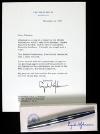

Johnson, Lyndon B
(1908-1973) 36th President of the U.S. (1963-69). As a Democratic
congressman from Texas (1937-49) he supported Pres. Roosevelt's New Deal.
Elected senator in 1948, he became majority leader following the 1954
elections. After losing the 60 presidential nomination to John F. Kennedy,
Johnson agreed to become Kennedy's running mate. After Kennedy's assassination
(Nov. 22, 1963) Johnson was immediately sworn in as president. Announcing that
he would carry out the late president's programs, he skillfully prodded
Congress into enacting (1964) an $11 billion tax cut and a sweeping Civil
Rights Act. Elected (1964) to a full term, he launched a program of social and
economic welfare programs to create what he termed the Great Society. It
included Medicare and Medicaid, federal aid to education, increased
anti-poverty programs (including Head Start), and the 1965 Voting Rights Act.
The Dept. of Transportation and the Dept. of Housing and Urban Development were
created. Johnson's domestic achievements, however, were soon obscured by
foreign affairs. When North Vietnam allegedly attacked (Aug. 1964) U.S.
destroyers, Congress passed the Tonkin Gulf Resolution, which gave the
president authority to take any action necessary to protect U.S. troops.
Johnson began (Feb. 1965) the bombing of North Vietnam and increased U.S.
forces in South Vietnam to nearly 550,000 (1969). The Vietnam War aroused
widespread opposition in Congress and among the public, and rioting (1968) in
the African-American ghettos of U.S. cities further marred his presidency. In
1965 Johnson sent U.S. troops into the Dominican Republic. He announced that he
would not run for reelection and retired to his Texas ranch.
Presidential Pen with Typed Letter Signed ("Lyndon B Johnson").
Manila Conference pen and a typescript copy of Johnson's Manila Conference
report to Congressional leaders make up part of this lot, the remaining piece
is the TLS on White House stationery, written to Rep. John Rooney. Accompanying
the Conference report, the note reads, in part: "...The Manila conference, I am
firmly convinced was a great success...I also want to take this opportunity to
express my personal appreciation and the gratitude of our Nation for the
contribution you made to the 89th Congress, the Great Congress..." Overall,
fine condition.
Estimated Value $1,500-2,000.
Lot 282
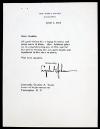

Johnson, Lyndon B.
Typed Letter Signed ("Lyndon B. Johnson"). One page, small quarto,
Washington DC, April 7, 1967. On White House stationery. To Rep. Charles Vanik
("Charlie"). Mailing fold, staple holes at top left, minor adhesive residue at
top edge of page (possibly from an early mounting), one small tear (½")
at left edge. Very good condition.
"All good wishes for a happy
birthday...Mrs. Johnson joins me in congratulating you..." Long time
Representative Charles Vanik (D-Ohio) served from 1955-1981 and, during the
Johnson Administration, was generally a supporter of White House policies
(there are even a few Johnson-Vanik conversations are on the notorious tapes).
Estimated Value $500-600.
1964 Civil Rights Act Pen
Lot 283


[Johnson, Lyndon Baines].
Presidential Pen used by Johnson to sign H.R. 7152, the 1964 Civil Rights
Act. Accompanied by a photostat color picture of the signing and a plexiglass
stand with label. The stand needs to be re-assembled, otherwise items are in
fine condition.
Arguably the most significant legislation of the 20th
century, the Civil Rights Act codified prohibitions on discrimination in public
accommodations and federal programs, authorizing the Attorney General to
institute suits against offending states, institutions and individuals. The
other important contribution of H.R. 7152 was the establishment of the Equal
Employment Opportunity Commission, the organization that did so much to
integrate the American workplace. The Civil Rights struggles of the mid-20th
century need to be remembered; these are struggles that provided our country
with heroes and martyrs who changed our society for the better and villains who
made us face the true necessity for the legal protection the Civil Rights Act
provided.
Estimated Value $3,500-4,000.
Lot 284


[Kennedy, John F.]
(1917-1963) 35th President of the U.S. (1961-63). After enlisting in the
U.S. Navy in World War II, he served with distinction as commander of a PT boat
in the Pacific. A Democratic congressman from Massachusetts (1947-53) and in
1952 won a seat in the U.S. Senate. Kennedy narrowly lost the Democratic vice
presidential nomination in 1956 and in 1960 won the party's presidential
nomination. He defeated Republican Richard Nixon, becoming at 43 the youngest
man to be elected president. His domestic program, the New Frontier, called for
tax reform, federal aid to education, medical care for the aged under Social
Security, and the extension of civil rights. Many of his reforms, however,
stalled in Congress, and foreign-affairs crises occupied much of his time. He
was much criticized for his approval for the abortive Bay of Pigs Invasion
(1961) of Cuba. In Oct. 1962 U.S. reconnaissance planes discovered Soviet
missile bases there. In the ensuing Cuban Missile Crisis, Kennedy ordered a
blockade of Cuba and demanded the removal of the missiles. After a brief and
tense interval, the USSR complied with his demands. The next year the U.S. and
the Soviet Union signed a limited treaty banning nuclear tests. Kennedy also
increased the number of U.S. military advisers in South Vietnam to about
16,000. He established the Alliance for Progress to give economic aid to Latin
America and created the Peace Corps. He also pressed hard to achieve racial
integration in the South. On Nov. 22, 1963, Kennedy was shot and killed in
Dallas, Tex. Vice Pres. Lyndon Johnson succeeded him as president. The Warren
Commission, appointed to investigate the assassination, concluded that it was
the work of a single gunman, Lee Harvey Oswald.
Presidential Pen used
to sign H.R. 11970, The Trade Expansion Act of 1962. Accompanied by a black and
white press photograph of Kennedy signing the bill. Fine condition.
The
U.S. Trade Expansion Act authorized the president to negotiate mutual tariff
reductions of up to 50 percent with other countries. It also established the
post of special representative for trade negotiations in the Executive Office
of the President to lead U.S. trade negotiation delegations as well as
interagency trade policy committees. The significance of the Trade Expansion
Act is obvious, given the fact that international trade today, including the
WTO and the NAFTA agreement, owe quite a bit to Kennedy's efforts at getting HR
11970 passed.
Estimated Value $3,000-4,000.
Ex. Ruddy Collection.
Lot 285
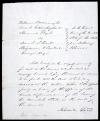

Lincoln, Abraham
(1809-1865) 16th President of the U.S. (1861-65). Born in a log cabin in
the backwoods, Lincoln was almost entirely self-educated. In 1831 he settled in
New Salem, Ill., and worked as a storekeeper, surveyor, and postmaster while
studying law. In 1834 he was elected to the state legislature, and in 1836 he
became a lawyer. Lincoln served one term (1847-49) in Congress as a Whig; in
1855 he campaigned for the Senate, but lost. In 1856 he joined the new
Republican Party. He ran again (1858) for the Senate against Stephen A.
Douglas, engaging in seven landmark debates. Lincoln was not an abolitionist,
but he regarded slavery as an evil and opposed its extension. Although he lost
the 1858 election, he had established a national reputation, and in 1860 was
the Republican presidential candidate. He ran against a divided Democratic
party and was elected with a minority of the popular vote. To the South,
Lincoln's election was a signal for secession. By Inauguration Day seven states
had seceded, and four more seceded after he issued a summons to the militia. It
is generally agreed that Lincoln handled the multitudinous problems of the
Civil War with skill and vigor. In addition to conducting the war, he faced
opposition in the North from radical abolitionists who considered him too mild,
and from conservatives who were gloomy over the prospects of Union success in
the war. His cabinet was rent by internal hatred, and the progress of the war
went against the North at first. In 1863 Lincoln moved to free the slaves by
issuing the Emancipation Proclamation, but preserving the Union remained his
main priority. His thoughts on the war were beautifully expressed in the
Gettysburg Address (1863). In 1864 Lincoln ran for reelection against George B.
McClellan and won, in part because of the favorable turn of military affairs
after his appointment of Gen. U.S. Grant as commander-in-chief. Lincoln saw the
end of the war but did not live to implement his plan for Reconstruction. On
Apr. 14, 1865, while attending a play at Ford's Theater, in Washington, D.C.,
he was shot by the actor John Wilkes Booth. He died the next morning. Although
deeply mourned at his passing, it took several years for a full-blown "Lincoln
legend" to develop but by the early 20th century he had become an object of
adulation and a symbol of democracy.
Document Signed ("A.
Lincoln"). One page, quarto, Springfield, May 9, 1857. On lined paper.
Being a bond posted by Lincoln in the case of Wainwright, Huntington and Flogel
versus Curtis, Curtis and Hugo. Docketed on verso. Professional restoration,
horizontal folds with very minor edge separation, three small spots of adhesive
residue on verso, five very small holes, one penciled notation recto and one
verso. Very good to fine condition.
The case this document pertains to,
Wainwright et al versus Curtis et al, concerned non-payment of a
promissory note in the amount of $1,322.83. The case was filed with the U.S.
Circuit Court on May 9, 1857, called June 1, and two judgements were rendered
June 3 in favor of Lincoln's clients. (Lincoln Day by Day, volume
II)
Lincoln's legal practice has been well documented, and the
continuing efforts of researchers and archivists have resulted in increasing
information about this formative time in his life. It is well established that
the dignified manner, eloquence and tenacity he developed in Illinois
courtrooms were patterns for his behavior as President.The document offered
here, signed when he had established himself as one of the most respected and
influential men in Illinois, represents Lincoln on the threshold of the his
national political life.
Estimated Value $5,000-UP.
Lincoln Wartime Note
Lot 286
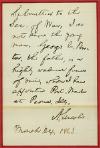

Lincoln, Abraham.
Autograph Note Signed ("A.Lincoln"). As President. One page, octavo,
n. p. (Washington DC), March 24, 1863. In black ink. To Secretary of War
Stanton. Matted and framed to an overall size of 9¾ x 14¼", with
correspondence to Lincoln mounted under glass on verso. One horizontal fold
with toning directly above signature, minor ink fading. Not examined out of
frame, appears to be in fine condition.
Lincoln's note, in full:
"Submitted to the Sec of War, I do not know the young man. George C. Bestor,
the father, is a highly valued friend of mine, whom I have appointed Post
Master at Peoria, Ills." The accompanying letter, written by P.B. Finke
(?), recommends George L. Bestor for the position of Quarter Master or
Commisary of Substance in the volunteer serice. Young Mr. Bestor was "among the
first in Illinois to volunteer" and had "served in all the campaigns -- his
health is impaired -- he is honest & capable and desires promotion". The young
man's father, George C. Bestor, Lincoln's "highly valued friend", was an
important business and political figure in Peoria who worked tirelessly for the
Whig and then Republican party -- campaigning vigorously for Lincoln during the
1858 senate race and again in 1860. The elder Bestor met with Lincoln in
Washington just a year before this note was penned. Presumably the two
discussed War matters, as Bestor was a vigorous patriot devoted to the cause of
the Union; almost bankrupting himself building ships for the Union Navy,
advocating a large appropriation for the arming and equipping of the Illinois
troops and generously contributing to soldiers' aid.
Estimated Value
$7,000-8,000.
Lot 287
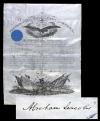

Lincoln, Abraham.
Document Signed ("Abraham Lincoln"). As President. Partially
printed, accomplished in manuscript. One page, 14¾ x 19¼",
Washington D.C., July 5, 1864. Being the military appointment of F.A. Copeland
to the position of Assistant Adjutant General of Volunteers. On vellum. In
black ink. Countersigned by Edwin Stanton as Secretary of War. Docketed in
purple ink at top left. Professional restoration, original blue War Department
seal has apparently been removed and expertly re-applied, ink has faded in
portions accomplished in manuscript, five horizontal and one vertical crease.
Signature is bold and the document is in good condition.
As prospects
for the Union appear to be improving, Lincoln appoints F.A. Copeland Assistant
Adjutant General in the rank of Captain.
Estimated Value $3,000-4,000.
Lot 288
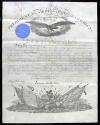

Lincoln, Abraham.
Document Signed ("Abraham Lincoln"). As President. Partially
printed, accomplished in manuscript. One page, 13¾ x 17½,
Washington D.C., February 21, 1862. Countersigned by Secretary of War Edwin M.
Stanton. Being an Army appointment to John J. Coppinger. On vellum. Wafer seal
intact and affixed to upper left. Recorder's signature at upper left corner.
One vertical and five horizontal folds; ink in portions is a bit faded, but
does not affect Lincoln's signature, light toning. Overall, in very good to
fine condition.
With tensions in the Union rising, and a clear need to
strengthen the military, here Lincoln names our soldier, John J. Coppinger,
Captain in the Fourteenth Regiment of Infantry. In fact, it was just ten months
earlier that Lincoln called for troops to join the army after Fort Sumter was
taken by the Confederates.
Estimated Value $3,000-4,000.
Lot 289
[Lincoln, Abraham] 1844
Whig Convention Flyer. Printed. One page, quarto, Peoria, May 8, 1844.
Addressed on verso to Hon. W.P. Walker of Lenox, Massachusetts, postmarked May
20. Manuscript postscript reads "Please inform us at your earliest opportunity
of the probable number of delegates.from your county". Transmittal folds, paper
loss where mailing wax was pulled away. Very good condition.
By 1844,
Lincoln was a mover and shaker in Illinois politics and was a key speaker and
committee chairman at the 1844 Peoria convention this flyer concerns. As a
delegate, Lincoln would have received the same letter, as it was sent to the
"fellow-laborer in the great cause in which we are engaged". Stressing the need
for a large convention ("a meager attendance.would be disastrous in the
extreme") the broadside also encourages delegates to bring "tents, cooking
utensils, provisions &c" as it would be "impossible to furnish house
accommodations." The convention was indeed a large one, with an estimated
attendance of 5,000-8,000 -- quite a crowd for Peoria.
Estimated Value
$75-100.
King Hostik, 1963.
"There is great excitement here about Lincoln..."
Lot 290
[Lincoln, Abraham]
Inauguration Letter. Autograph letter from Jacob H. Baxurrn of
Elizabethtown to Abraham Brenerman, dated March 5, 1861. Quarto. Transmittal
folds. else fine.
Lincoln's inauguration spelled the beginning of a new
era in American politics, a changed welcomed by the staunch Union supporter who
wrote the letter offered here. After the usual pleasantries, Mr. Baxburrn gets
to the point, "...There is a great excitement in here about Lincoln but we
are for Union and no compromise. Only one compromise that is this: they say
that they ought to be hung & drop 4 feet, well I say let them drop 8 feet that
is our compromise..."
Estimated Value $200-250.
Lot 291
[Lincoln, Abraham]
Lincoln Day by Day ed. Miers, Earl Schenck. Washington: Lincoln
Sesquicentennial Commission, 1960, three volumes, quarto. Hardbound, blue cloth
covers. Minor spine fading and wear, a few pencil marks in text, minor edge
toning, else, fine condition.
"I was born Feb. 12. 1809 in then Hardin
country Kentucky" -- from his birth through his tragic assassination,
Lincoln Day by Day details the life of our best-loved president. An
invaluable resource for scholars and collectors, this assemblage of childhood
anecdotes, legal decisions and presidential minutiae offers context and
background for documents and letters written by and about Lincoln.
Estimated Value $150-200.
Lot 292
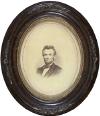

[Lincoln, Abraham]
Photographic Print. Oval portrait of Abraham Lincoln. Mounted on a card
printed "J. Gurney & Son, Photographists". Circa 1860-1874, this sepia toned
photograph measures 6¼ x 8" and is a bust portrait of Lincoln. Framed to
12½ x 14¼". Imperfections in the plate and minor abrasion
throughout (most minor), card has toned . Frame shows age. In good condition
overall.
A handsome portrait enhanced by a period frame.
Estimated
Value $125-150.
Lot 293
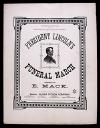

[Lincoln, Abraham] Sheet
Music. Composed by E. Mack, published in Boston by Oliver Ditson Company.
Bold graphic cover with portrait of the President. Six pages, 10 x 14". The
national, indeed international, mourning at the death of Abraham Lincoln was
astounding. President Lincoln's Funeral March offered here is
"Respectfully Dedicated to the People of the United States" and serves as an
example of the outpouring of grief the country felt. Lightly toned, minor soil
at bottom edge, 3" tear at right edge. Fine condition.
Estimated Value
$250-300.
Lot 294


Monroe, James
(1758-1831) Fifth president of the United States [1817-1825], his two
administrations were characterized as the Era of Good Feelings because of the
relative calm and prosperity enjoyed by the expanding nation. Monroe's most
notable foreign policy achievement was the development of what came to be
called the Monroe Doctrine -- a policy of isolationism and the protection of
North America from further European colonization.
Document Signed
("James Monroe"). As President. Partially printed, accomplished in
manuscript. One page, large quarto, Washington D.C., April 3, 1818. Being a
land grant for one Jonathan Richardson. On vellum. In black ink. Countersigned
by Josiah Meigs as Commissioner of the General Land-Office. Docketed on verso.
State of Illinois registry (May 18, 1841) affixed to left center edge, folds
back to reveal body of main document. Seal is missing, foxing throughout, age
toning particularly at edges, two horizontal and one vertical fold, abrasion
where seal was removed, four small holes at bottom horizontal crease, the ink
in Monroe's signature shows minor flaking. Overall, good condition.
The
160 acres in western Illinois that this document grants to Jonathan Richardson
were part of a huge tract annexed by the government and offered as bounty to
men who volunteered for military service during the War of 1812. Richardson,
who served in Goodell's Company of the 23rd Infantry, was one of thousands of
ex-soldiers who were free to either farm or sell the land they received via an
1812 Act of Congress -- an act that rewarded service without draining the
Treasury and ensured a steady flow of settlers to the Mississippi River Valley.
Estimated Value $1,000-1,250.
Lot 295


Monroe, James. Document
Signed ("James Monroe"). As President. Partially printed, accomplished
in manuscript. One page, small oblong folio, Washington, May 1, 1824. On heavy
vellum. Countersigned by George Graham as Commissioner of the Land Office.
Being a land grant to one Alexander Mitchell. The seal is intact. Expected
folds, minor foxing throughout. Very good to fine.
Granting a half
quarter in Huntsville, Alabama.
Estimated Value $1,000-1,200.
Nixon the High School Senior
Lot 296
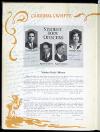

Nixon, Richard M
(1913-1994). 37th President of the U.S. (1969-74). He was elected to the
vice presidency on the Republican ticket with Dwight D. Eisenhower in 1952;
they were reelected in 1956. Kept closely informed, Nixon played an important
role in government affairs. He ran for president in 1960 but was defeated by
John F. Kennedy. In 1968 he again won the Republican presidential nomination
and, with his running mate, Spiro T. Agnew, defeated Hubert H. Humphrey and
George C. Wallace. Investigations into the Watergate Affair and studies by the
Internal Revenue Service revealed pervasive corruption in Nixon's
administration, and in 1974 the U.S. House of Representatives began impeachment
proceedings. On Aug. 9 he became the first president to resign. His successor,
Gerald R. Ford, granted him a full pardon, quashing the possibility of criminal
proceedings. In retirement Nixon continued to comment, often influentially, on
foreign affairs and wrote his memoirs (1978) and several other books.
Signed Yearbook with Inscription ("Rich Nixon"). Cloudsly
French's Whittier Union High School Yearbook 1930, quarto, 190 pp. Richard
Nixon was an active member of the student body at Whittier, no doubt honing
those political and networking skills which would prepare him for a life of
politics, and he appears on various pages as General Manager of the Student
Body, the Features Writer of the Cardinal & White Newspaper and President of
the Scholarship Society, in addition to his senior portrait. The two highlights
of this outstanding offering include one of Nixon's first published speeches
and a kind tribute penned to his friend Cloudsly. Nixon's speech, "America's
Progress -- Its Dependence Upon the Constitution" took first place in
competition at the Kiwanis Club in Whittier (for a $10 prize) and won a $20
prize from the Los Angeles Times. Printed on page 154, the speech offers a
glimpse into the young Nixon's political philosophy and makes for very
interesting reading. Nixon's comments to French provide a glimpse into another
side of the young man, as he offers a warm greeting to a fellow senior:
"Heres to the best artist I have ever known and I don't mean maybe. Good
luck to you; and stay away from Brunettes -- they aren't you[sic] type.
Rich Nixon" The book itself shows some edge and spine wear, but is intact
and in very good condition.
A similar yearbook, without the personal
note, recently sold at auction for $4,000.
Estimated Value $3,000-UP.
Lot 297
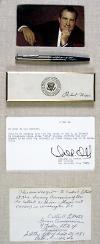

[Nixon, Richard M.].
Presidential Pen used to sign the William-Stieger Act (Occupational Safety
and Health Act -- OSHA). Mounted and framed with notes of authentication from
the original owner, Curtis A. Lutrell and the subsequent buyer, William R.
Orbelo. A printed Norman Rockwell portrait is at the top of the group. Fine.
Estimated Value $1,250-1,500.
Ex. Ruddy Collection.
Lot 298
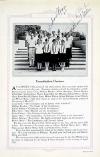

Nixon, Richard M.
Yearbook Signed ("Richard Nixon '30"). Cloudsly French's 1929
Whittier Union High School Yearbook, quarto, 181 pp. Nixon has signed above his
picture on the "Constitution Orators" page. Nixon was active in this
organization, winning first place in the Kiwanis Club competition and again at
the District Contest against South Pasadena. Nixon's speech "Our Privileges
Under the Constitution" is printed on the two pages following the Club's
picture and is a well-reasoned speech that was obviously a favorite, lauding
personal and political liberties and advocating greater voter involvement. "By
these two political privileges, of suffrage and of holding office, the American
citizen is a ruler more powerful than any king. Let us not be unworthy of our
great power." There is edge and spine wear to the volume and the center of the
book (including the Nixon pages) are separating from the binding at the bottom
half.
Estimated Value $500-UP.
Nixon and Support for the Vietnam War
Lot 299
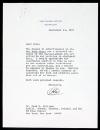

Nixon, Richard M. Typed
Letter Signed ("RN"). As President. One page, small quarto, Washington
DC, September 21, 1970. On White House stationery. To Paul W. Williams.
Transmittal envelope included. Transmittal fold, paperclip stain, else
fine.
Following the 1969 revelations in the New York Times of Nixon's
secret bombing campaign in Cambodia, Nixon's popularity suffered (not enough to
keep him from being re-elected in 1972) and he relied on the support of his
long-time backers to keep a positive slant. Thanking Williams for a supportive
New York Times advertisement, Nixon writes: "The August 31 advertisement...was
a splendid example of the encouragement you are giving to our policies in
southeast Asia. I deeply appreciate the confidence implied in this as well as
the various other initiatives you are undertaking..."
Estimated Value
$700-800.
Go to Next Catalog Page
















